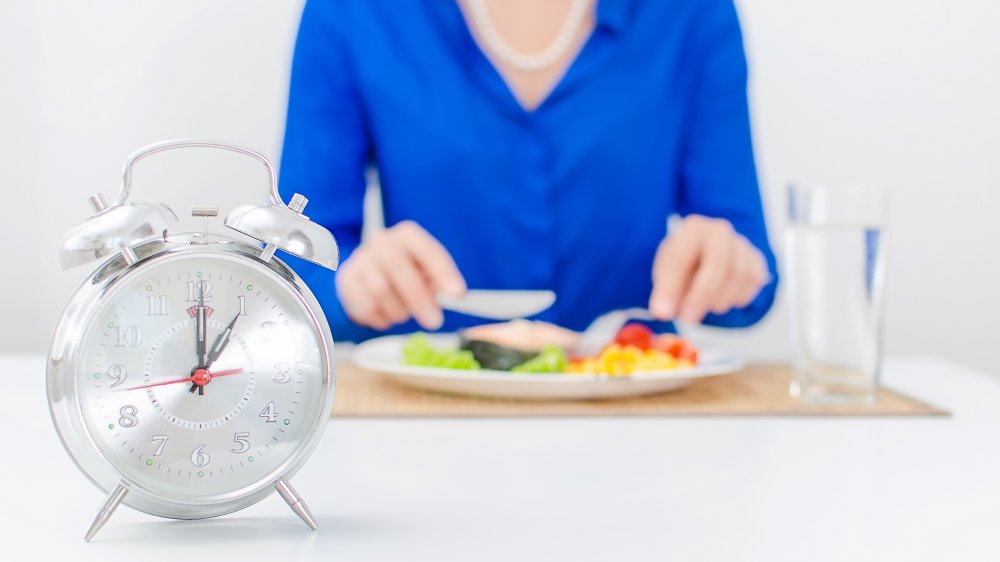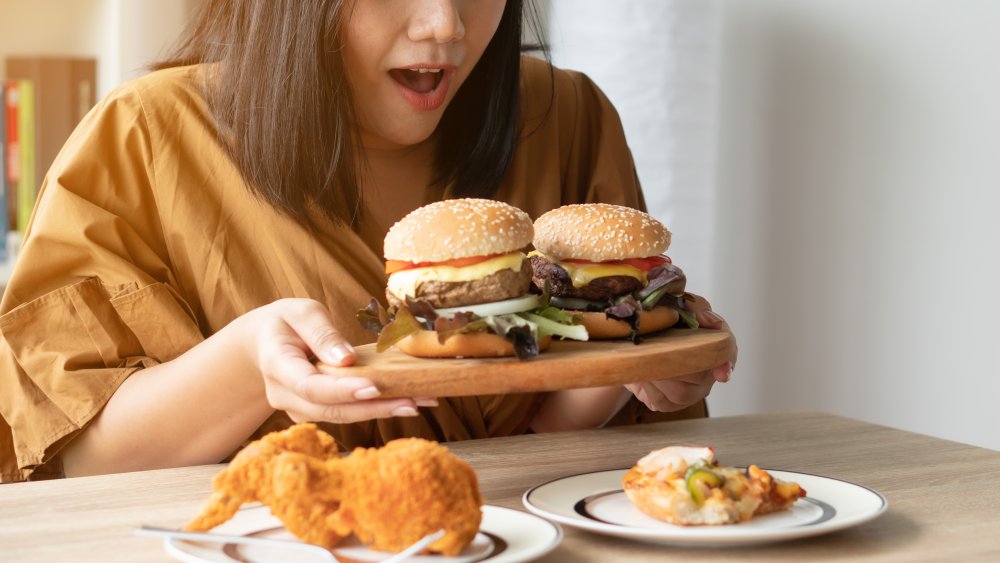Does Intermittent Fasting Really Work? Here's What Jillian Michaels Thinks
There's no hotter buzzword right now in wellness circles than intermittent fasting, or IF, a lifestyle that limits the hours in which you eat. Typically, people will fast for 12 hours — for example, stopping eating after dinner and not taking a bite until breakfast — or 16 hours, which might mean lunch is your first meal of the day. Others will fast for 24 hours twice a week, an approach called 5:2 (per Healthline).
If just thinking about all of this lack of food is making you hungry, you might feel differently when you see the before and after pictures online, or hear IFers gush about how easy it is to keep calorie consumption under control when they only allowed themselves to dine during certain windows. "I feel amazing. I feel fantastic. I have newfound confidence," boasted a 43-year-old woman who lost 80 pounds in a year (via Today).
But does IF deserve all of this hype? In an interview with The List, Jillian Michaels, health and fitness expert and creator of the Jillian Michaels Fitness App (available in iOS, Android and on the Samsung Health wellness platform) had praise for this method — but not because of its weight-loss benefits. "While I DO think there are benefits to intermittent fasting, WHY and HOW you are doing it is key," she cautioned.
Intermittent fasting isn't a good way to lose weight
The reason why Michaels doesn't love IF as a weight loss strategy is that restricting the hours in which you eat is no guarantee that you'll shed a single pound. "Intermittent fasting should NOT be a weight-loss strategy ... [It] actually has nothing to do with calorie restriction. It simply concentrates the hours in which you are consuming your calorie allowance," Michaels explained. "However, some may lose weight on it because they aren't overeating the way they would if they weren't cutting off food intake after dinner."
Jillian Michaels pointed out that people can be pretty good at packing in a ton of calories, even when they don't give themselves a lot of time to eat it all. "Many go back for seconds or a late night snack and those calories add up over time," she observed. "So it isn't the intermittent fasting that's causing the weight loss — it's still reducing calories. However, if the eating schedule lends itself to that, it will reduce your weight over time."
Fasting has health benefits that go beyond weight loss
Jillian Michaels said there are many health benefits to fasting intermittently, even if it's not a great way to lose weight. This is because going for prolonged periods without food spurs on healthy processes within your body that support your immune health. "The idea is not to starve yourself, but to create a period of your day where you aren't eating in order to free your body up to better focus on autophagy," Michaels explained. If you haven't heard of this term, it's "the process in which your body culls dead and senescent tissue — think of it like housekeeping," she said.
If this concept of autophagy is new to you, perhaps you're wondering why our bodies need to get rid of these senescent, or old and dead tissue, in the first place. According to Michaels, disposing of what our bodies no longer need is healthy. "Creating this overnight fast, be it 12 or 16 hours, is great for anti-aging and helps the body fend off disease, as it's constantly removing dead cells," Michaels said. "And when those accumulate, it isn't good."
The best approach to intermittent fasting is a 12-hour fast
Intermittent fasting is a balancing act — you want to enjoy all of the immune benefits of going for a long stretch of time without eating, but you also don't want to become so hungry that you can't maintain the lifestyle, according to Michaels. "Personally, I recommend the 12-hour window to get the autophagy benefits without the risk of overeating when you finally eat," she added.
As for the 16-hour approach, Michaels has mixed feelings. "I personally don't recommend a 16-hour fast because it causes many — myself included — to become overly hungry so when they do finally eat they end up overeating, and that isn't good. However, some doctors will recommend a 16 hour window for people with insulin-related health conditions like type 2 diabetes." Going a longer stretch without food is beneficial to diabetics, Michaels explained, "because it elongates the period where you don't have circulating insulin — simply because you aren't eating," she explained. "This can help accelerate the rate in which you sensitize your body to insulin." If you're a diabetic who'd rather aim for 12-hour fasts, getting in workouts may get you to your goal without needing to fast for quite so long, Michaels advised. "The number one way to sensitize your body to insulin is exercise," she explained.
Jillian Michaels thinks the 5:2 intermittent fasting strategy is "garbage"
While Michaels sees good rationales for both the 12-hour and 16-hour intermittent fasting strategies, she didn't mince words when asked what she thinks of spending two days per week in a complete fast — or eating a max of 500 calories twice a week — and eating as you please the rest of the week. "Now, the 5:2 diet is simply garbage," Michaels emphasized. "The idea that you don't watch what you eat five days of the week and then starve yourself two days of the week is ridiculous." According to Michaels, this approach is more likely to lead to binging than other types of IF. For example, take a scenario in which someone fasts over the weekend. "You do so much damage Monday through Friday with overeating that Saturday and Sunday can't begin to reverse it," Michaels explained.
Ultimately, Michaels said, any dieting strategy you follow needs to have mindful eating at the center. "These extremes are terrible for a healthy mindset," she added. "You should never give yourself free rein to go crazy. Overeating is extremely bad for your health even if you aren't overweight."




